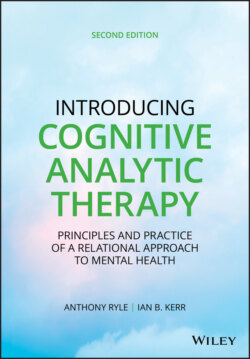Читать книгу Introducing Cognitive Analytic Therapy - Anthony Ryle - Страница 48
The Permeability of the Self
ОглавлениеAlthough most of us have a strong sense of our individuality and separateness, more especially in Western cultures, we argue here that this individuality is essentially rooted in, formed, and maintained in relationships, immediate and extended, with others. In this historical period, in which individualism is a dominant, largely unconscious, experience and belief, the view articulated here may be felt to be counter‐intuitive. Indeed most psychotherapeutic models, even those overtly espousing an interpersonal perspective, remain in our view essentially monadic in their view of human beings, with the partial exception of group analytic approaches (see, e.g., Brown & Zinkin, 1994; Ormay, 2012; Gantt and Badenoch 2013). A fuller understanding of the ways in which external social and internal psychological processes are mutually influenced will require continuing study, but for this to be productive we believe the Vygotskian and Bakhtinian perspective or paradigm needs to be taken on board. The following quote from Bakhtin (1986) provides, by way of example, from a literary source, a persuasive and poetic account of the apparent paradox of the Self's existence, but only through and dependent on the other: “I am conscious of myself and become myself only while revealing myself for another. The most important acts constituting self‐consciousness are determined by a relationship toward another consciousness (toward a thou) … not that which takes place within, but that which takes place on the boundary between one's own and someone else's consciousness, on the threshold … a person has no internal sovereign territory; he is wholly and always on the boundary; looking inside himself, he looks into the eyes of another or with the eyes of another.”
